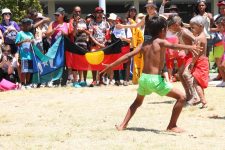Specialist Courts for Indigenous Youth: A Positive Approach

The Northern Territory’s criminal justice system has been heavily criticised in the wake of an ABC expose which highlighted the horrific abuse of children in custody.
The Four Corners investigation revealed lies and cover-ups by senior officials including the Corrections Minister himself, who seemingly had no problem with fabricating allegations against Indigenous youth to justify their mistreatment.
A number of experts are now calling on both major parties to address the overrepresentation of Indigenous children in the NT criminal justice system before the August election.
One suggestion which is gaining momentum is the establishment of specialist courts designed to deal with Indigenous defendants, with a focus on breaking the cycle of crime.
The courts would work together with community organisations to devise and implement alternatives to incarceration.
Social Service Campaign
The ‘Making Justice Work’ campaign seeks to bring several organisations together with a view to addressing the cycle of youth crime, including:
- the Red Cross,
- the North Australian Aboriginal Justice Agency,
- the Central Australian Aboriginal Legal Aid Service,
- the NT Legal Aid Commission,
- the Aboriginal Medical Services Alliance,
- Catholic Care NT, and
- the NT Council of Churches.
The campaign aims to provide support services to disenfranchised youth, to address feelings of despair and hopelessness, and to help them make something of themselves.
The Problem
The Northern Territory has the highest incarceration rate in the country, with roughly 1% of the State’s population behind bars, according to the Australian Bureau of Statistics.
The Territory’s overall incarceration rate of 958 per 100,000 residents is far higher than any other Australian jurisdiction – with WA being the next closest at 294 ,and NSW sitting at 210.
The NT also has the highest rate of children in custody at 167 per 100,000 kids, three times higher than any other state or territory.
About 83% of adult inmates and 97% of juveniles behind bars in the NT are Indigenous, despite Indigenous people comprising only 30% of the population.
The Four Corners expose is just one example of how the government has failed to reduce crime through its implementation of increasingly punitive measures. Such measures include removing the presumption of bail for repeat child offenders, implementing mandatory sentencing regimes and increasing maximum penalties.
Patrick Dodson, an Indigenous leader and Labor candidate for the Senate, is highly critical of the government’s policies and approach to Indigenous crime:
“We have also on the other hand a propensity of jurisdictions to introduce mandatory sentencing, introduce law and order type campaigns without any real consideration of the factors that underlie why people commit crime,” Mr Dodson said.
“That is because we live in poverty, because the lack of proper education, the lack of opportunity for jobs, the lack of real engagement with the society.”
Aims of the Campaign
The Making Justice Work campaign has called for an Aboriginal justice agreement which would establish specialist, therapeutic courts to address drug and alcohol dependency, mental health issues, and the lack of access to housing and employment for Indigenous communities. The courts would devise specialised plans to support and help divert children away from crime.
John Adams, general manager of the Jesuit Social Services in Alice Springs, believes that specialist courts would better address the different needs of juveniles, helping to rehabilitate kids whose “brains haven’t fully developed yet.”
The proposed courts would be modelled on the Youth Court in Alice Springs and Victoria’s Children’s Koori Court, which have already seen positive results.
Effectiveness of Specialist Courts
Felicity Gerry QC, who leads the Indigenous Justice Project at Charles Darwin University, says that existing specialist courts demonstrate that crime can be reduced by focusing on the basic needs of offenders. She says the proposed campaign:
“… is about is crime prevention – if you can address what the issues are with children, they’re not going to commit crime”.
Ms Gerry highlights the fact that an evaluation of children who came before the two oldest Koori courts run from 2002 – Shepparton and Broadmeadows – found that they had reduced recidivism rates, less failures to appear on bail and fewer breaches of correctional orders.
In terms of specialised drug Courts, the NSW experience is particularly informative. A 2008 evaluation found that offenders who went through the Drug Court Program were 17 per cent less likely to be reconvicted for any offence, 30 per cent less likely to be reconvicted for a violent offence, and 38 per cent less likely to be reconvicted of a drug offence – impressive figures indeed.
Political Response
Former Corrections Minister John Elferink had made it clear he would not support the establishment of specialist youth or drug courts:
“Labor’s approach, supported by Naaja (North Australian Aboriginal Justice Agency), will be to keep criminals out of custody,” he said.
Shadow Attorney-General, Lynne Walker, says Labor will be making announcements about its justice initiatives before the upcoming election, saying her party “broadly supports the direction of the Making Justice Work campaign”.
It is hoped the NT will recognise that a punitive, heavy-handed approach to youth crime does not work, and will adopt initiatives leading to positive results for both children and the community.






